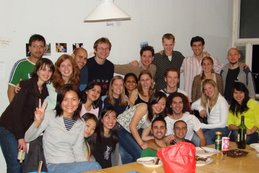Today I did some research about the KRAV eco-label on their website: http://www.krav.se/english.asp to try to understand some more about this shadowy, omniscient, omnipresent endorser of all that is good and meritorious in Swedish food production.
The first thing I learned is that KRAV is organised as an incorporated association
 with 28 members representing the full range of interests when it comes to food production. Their standards are subject to the approval of a global umbrella organisation called the International Federation of Organic Agriculture Movements. KRAV employs 70 people, about half of which are engaged full-time in inspecting the producers that receive their certification. That’s to say, in the case of organic crops, ensuring that they are not produced with conventional pesticides, artificial fertilizers, GMOs, human waste, or sewage sludge, and that they were processed without ionizing radiation or food additives.
with 28 members representing the full range of interests when it comes to food production. Their standards are subject to the approval of a global umbrella organisation called the International Federation of Organic Agriculture Movements. KRAV employs 70 people, about half of which are engaged full-time in inspecting the producers that receive their certification. That’s to say, in the case of organic crops, ensuring that they are not produced with conventional pesticides, artificial fertilizers, GMOs, human waste, or sewage sludge, and that they were processed without ionizing radiation or food additives.By browsing through KRAV’s annual report for 2006, I learned that by buying KRAV milk I had helped to reduce eutrophication of waterways by 3 000 000kg, and reduce chemical pesticide consumption by 35000kg. I also learned that the country with the highest rate of spending on organic foods is Switzerland, with 950SEK per consumer every year. It is then a long way back to Denmark, in second place with 475SEK per consumer, and Sweden at 446SEK. So very much still a rich country’s club!
Overall, the report gives the impression of an industry (eco-labelling, and to a lesser extent organic farming) booming in these times of increased environmental awareness. The report also mentioned the possibility of KRAV moving into carbon labelling, but said that such a development “is dependent upon the level of interest among the market stakeholders. – There’s no point in us developing additional labelling if it is not requested by consumers and producers”. It will be interesting to see, when the 2007 report comes out, whether progress has been made on this issue.
For our Halloween party tonight, I bought some “fairly traded” Sackeus Indonesian “Exotic Chips”. Sackeus is a new fair trade brand that I hadn’t come across before. Under their logo on their website they have written “The True Fair Trade Company”, but unfortun
 ately the rest of the website is in Swedish so I can’t investigate the rationale behind this faintly aggressive sub-title. But the chips were tasty, and I took the opportunity to promote my project amongst the other party-goers. This is paradoxically more for my own benefit than theirs: I know my own ethical disposition, and I loathe hypocrisy. I know that if I tell lots of people that I am doing something, then I am much more likely to force myself not to cut corners, even when I am in the supermarket by myself and no-one is directly surveying me. I would like to somehow connect this conception of ethics with Jurgen Habermas’ theory of communicative rationality, but I might be stretching the concept a bit far here. In any case, the power of communication should not be dismissed, even when the only person you can hope to persuade is yourself.
ately the rest of the website is in Swedish so I can’t investigate the rationale behind this faintly aggressive sub-title. But the chips were tasty, and I took the opportunity to promote my project amongst the other party-goers. This is paradoxically more for my own benefit than theirs: I know my own ethical disposition, and I loathe hypocrisy. I know that if I tell lots of people that I am doing something, then I am much more likely to force myself not to cut corners, even when I am in the supermarket by myself and no-one is directly surveying me. I would like to somehow connect this conception of ethics with Jurgen Habermas’ theory of communicative rationality, but I might be stretching the concept a bit far here. In any case, the power of communication should not be dismissed, even when the only person you can hope to persuade is yourself.It’s a bit like the power of the self-fulfilling prophecy that I think could hold a key to more sustainable behaviour, especially in societies like North America (I know I am painting with broad strokes here) where there is a lot of pressure to appear optimistic and positive-minded. If only the environmental discourse could be shifted from negative issues of climate change destruction to the positive message of how sustainable life styles improve your quality of life then the climate change sceptics and the lifestyle change refuse-lings would be framed as “negative”, and ultimately socially excluded. The happiest people I have ever met in my life have almost always been the ones that consume least and live closest to nature,
 but somehow that idea gets hidden behind the negative attitudes towards “scaremongering”. If only sustainable living became aspirational and connected with positive images, it could become a self-fulfilling prophecy for so many people.
but somehow that idea gets hidden behind the negative attitudes towards “scaremongering”. If only sustainable living became aspirational and connected with positive images, it could become a self-fulfilling prophecy for so many people.Economic Sustainability Tip of the Day: KRAV bananas. Between 15 and 20SEK. Hardly anything more in price than conventional ones, but much less likely to be propping up a banana republic, destroying tropical rainforest or poisoning local workers.

No comments:
Post a Comment